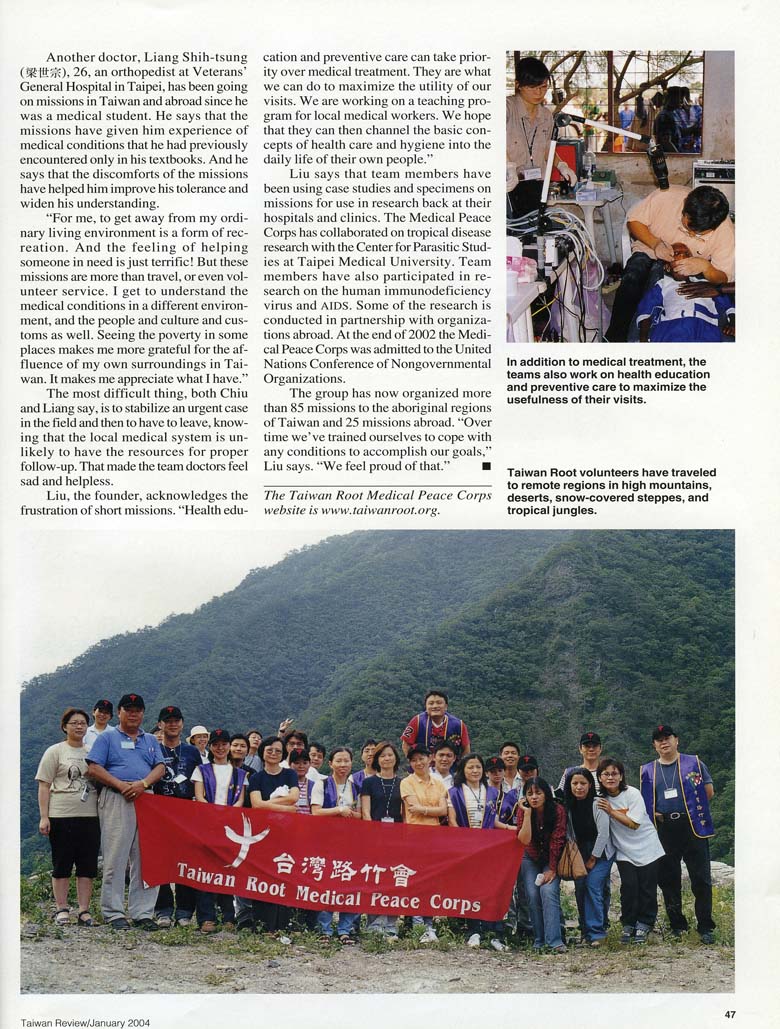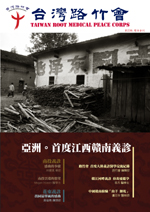
熱門標籤
Page Viewed:14230593
2004 Reported by "Taiwan Review", issued by the Government Information Office, R.O.C.
2004 Reported by "Taiwan Review", issued by the Government Information Office, R.O.C.
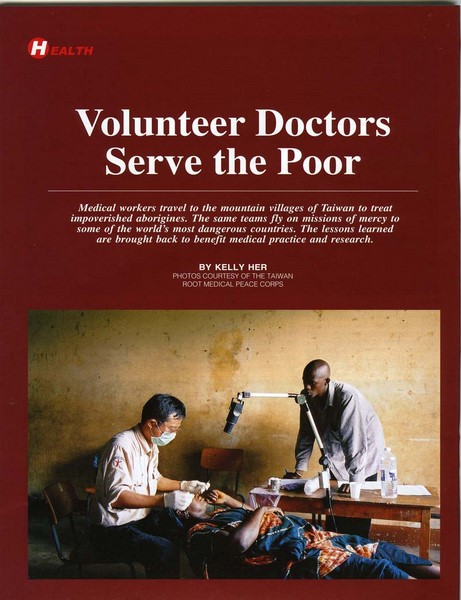
Volunteer Doctors Serve the Poor
It's three in the morning. After a long day most of Taipei has fallen into deep sleep. Only a few night workers, clubbers, and insomniacs move on the streets. But in one corner of the city a convoy forms. Jeeps, vans, and trucks are loaded with medical supplies. Sixty volunteers climb aboard.
It may be an ungodly hour, but three a.m. is the regular departure time for this organization. The convoy must traverse winding, narrow roads in the mountains to remote villaes. The volunteeers want to arrive early enough to hold clinics for three villages in one day. When the volunteers arrive at the first village, some set up their clinic in a schoolroom or in a church. Others fan out with loudhailers along the lanes of the village, inviting people to come for treatment.
The volunteers include general practitioners, dentists, gynecologists and obsetetricians, orthopedists, pediatricians, nurses, laboratory technicians, and pharmacists. So these are fully qualified professionals, not barefoot doctors. But the villages they serve are among the country's poorest. The effects of that poverty include alcoholism and adolescent prostitution.
The Taiwan Root Medical Peace Corps has organized these monthly medical aid convoys since 1995. Liu Chi-chun, the dentist whho founded the group, says the name "root" refers to the bamboo along the mountain paths that his colleagues travel. And, despite the name "peace corps." the group is private. "Our objective is to increase access to medical care and health education in the isolated regions and to improve the llives of the people there. We hope, through concerted and persistent work, not just to offer temporary relief but to lay the foundations for permanent health care systems."
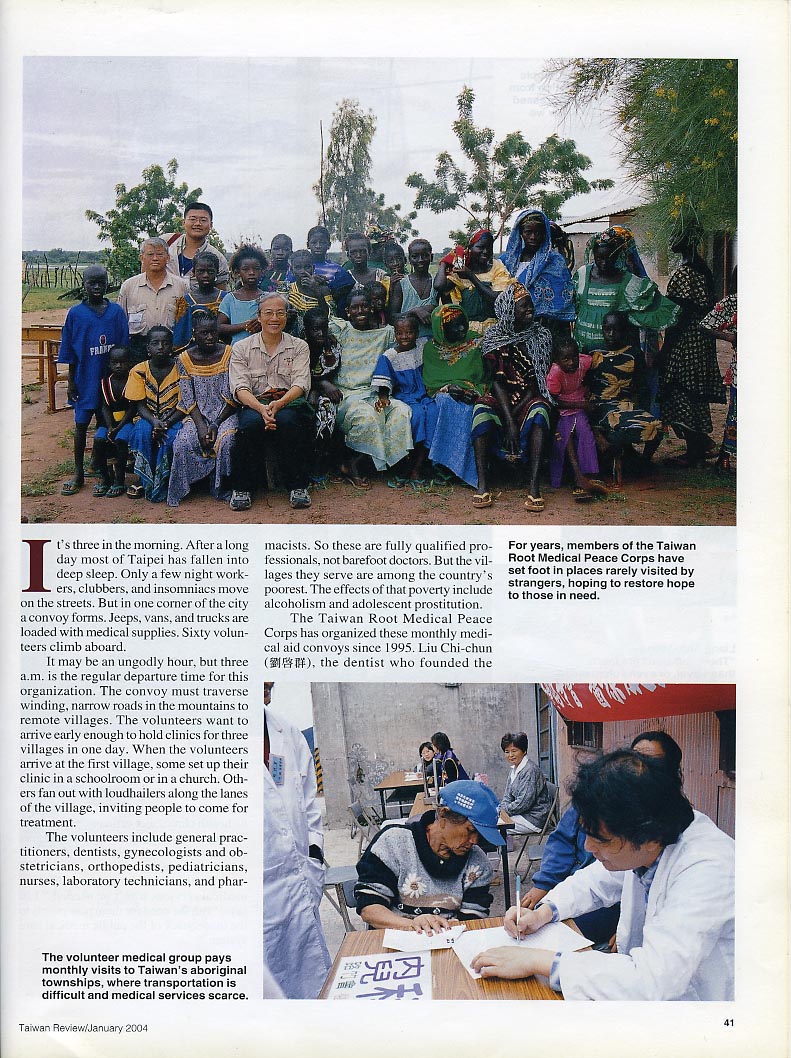
Liu says that the Natioal Health Insurance Program is good as far as it goes, but unemployed people are not covered unless they have the money to pay a monthly premium. He says that some mountain townships lack even basic public health clinics, not to mention hospitals. The teams try to help aboriginal villagers represent themselves before public and private agencies.
"Eventually, we hope, volunteer medical services won't be needed," Liu says. "But the need for them now points to the inadequacy of the public medical care system."
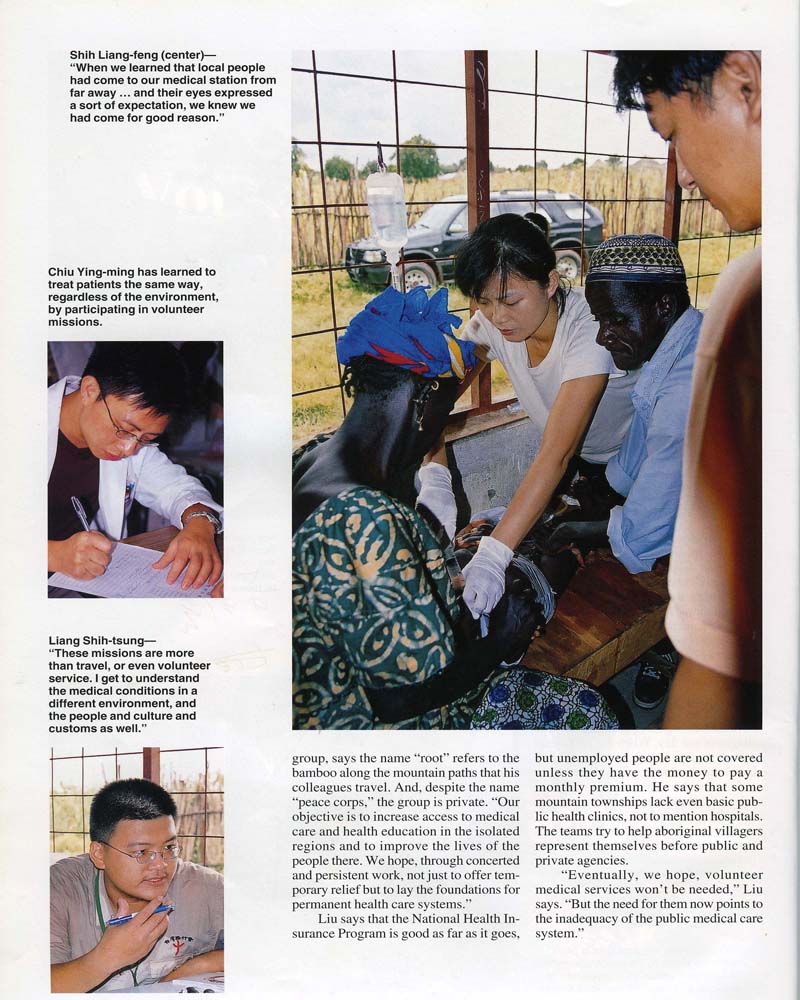
Chen Kuang-chuan, a Presbyterian minister in mountainous Miaoli County, in the north of the island, says, "We always look forward to the arrival of the teams. We're grateful for their efforts. It's a comfort to think that we have not been forgotten by society. The visits of the teams are a big help to small villages like ours. About 30 percent of our people are not covered by National Health Insurance. We need medical care. Illnesses are constantly aggravated by heavy drinking and by economic troubles."
In another mountain village, in the center of the island, Lai Ya-hui 35, brings her four children to the team for examination and treatment. "It takes us more than two hours to drive along the winding roads down to the lowlands to see the doctor. So we appreciate it when these doctors come to us. And these doctors are very kind to us. The services they provide are really needed, especially by our children and old people. We just hoep that the team can come here more often."
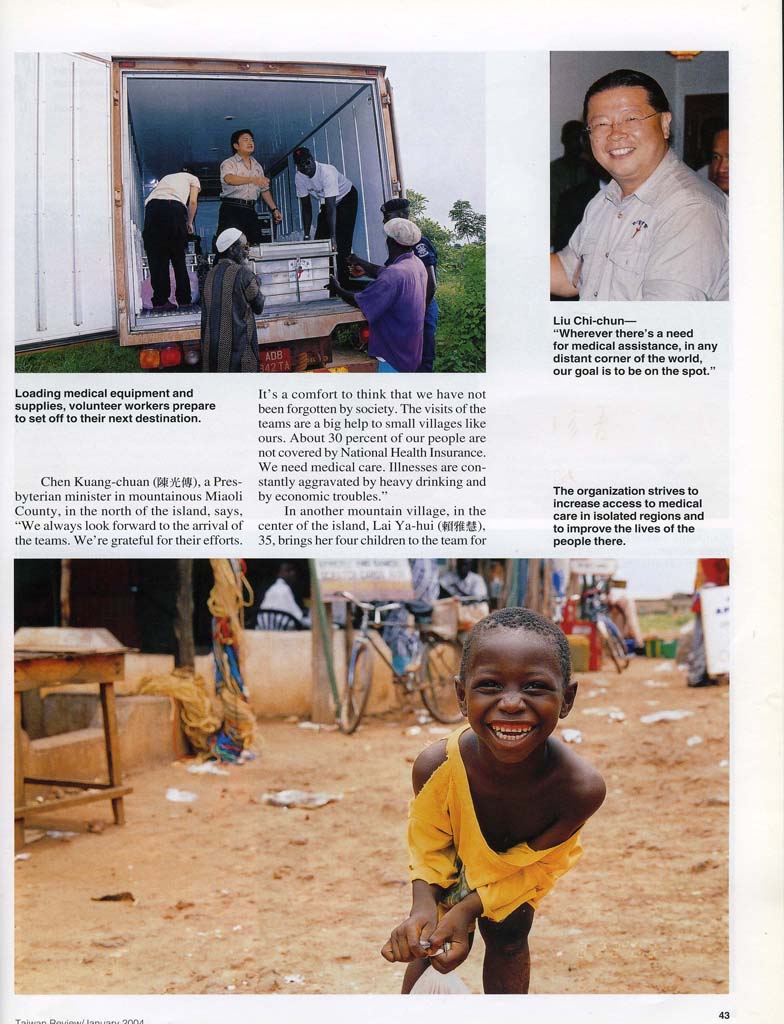
Liu, the founder, says that the group began by making a list of villages it wanted to visit. At first the teams could visit each village only once a year. Now, because of improvements to the roads and because of economic progress in some villages, the teams can make their rounds in only six months. Liu says that the team have never failed to reach their destinations, despite typhoons and floods. "Natural disaster are the moments of greatest need for the mountain townships. That the villagers are waiting for us has been the motivation that has kept us going."
As the Medical Peace Corps gained experience in the mountains of Taiwan, Liu formed the idea of responding to medical needs abroad. "Whereever there is a need for medical assistance, in any distant corner of the world, our goal is to be on the spot," he says. In 1999 the Ministry of Foreign Affairs asked the group to send a mission to serve refugees from Kosovo in Macedonia. It was the group's first international mercy mission. Since then, teams have served in Asia (Afghanistan, India, Indonesia, the Philippines, and Sri Lanka), in Africa (Gambia, Ghana, Liberia, and Swaziland), and in the Caribbean and Latin America (Bolivia, the Dominican Republic, Haiti, Paraguay, and Peru). The teams respond to emergencies thrown up by war or natural disaster, but the organization also tries to send teams back to the same countries for repeat visits.
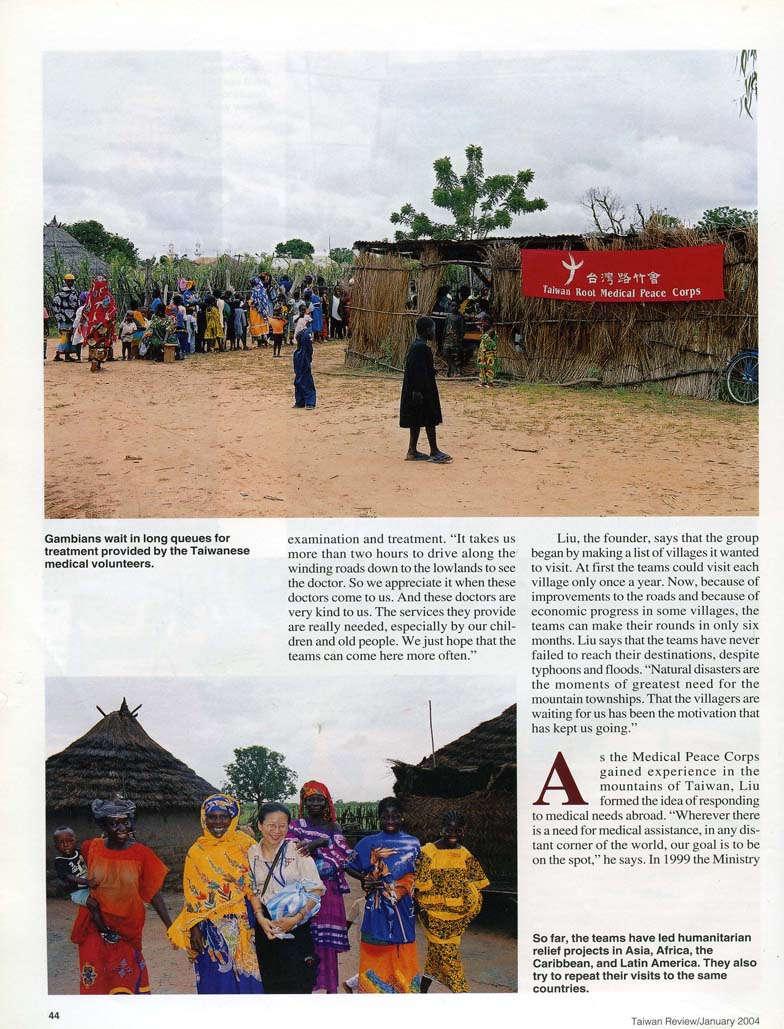
Shih Liang-feng, a 30-year-old anesthetist, remembers her first mission to Liberia. The team worked from early in the morning to late at night. There was no electricity. When it was dark they relied on a generator for lighting or worked under the headlights of a car or truck. It was the dry season. Water was so scarce that the team could not shower for five days. Shih says she can still remember her first shower under running water on their way home.
"Despite all the challenges, I always thought to myself, if I hadn't come here, who else would have? When we learned that local people have come to our medical station from far away, and saw them waiting in long queues for treatment, we knew we had come for good reason. When I was treating my Liberian patients I often had to fight back tears. Their eyes expressed a sort of expectation, a little bit of hope. That little bit of hope is the motivation behind our missions. That's why we give up our holidays and pay our own air fares to participate."
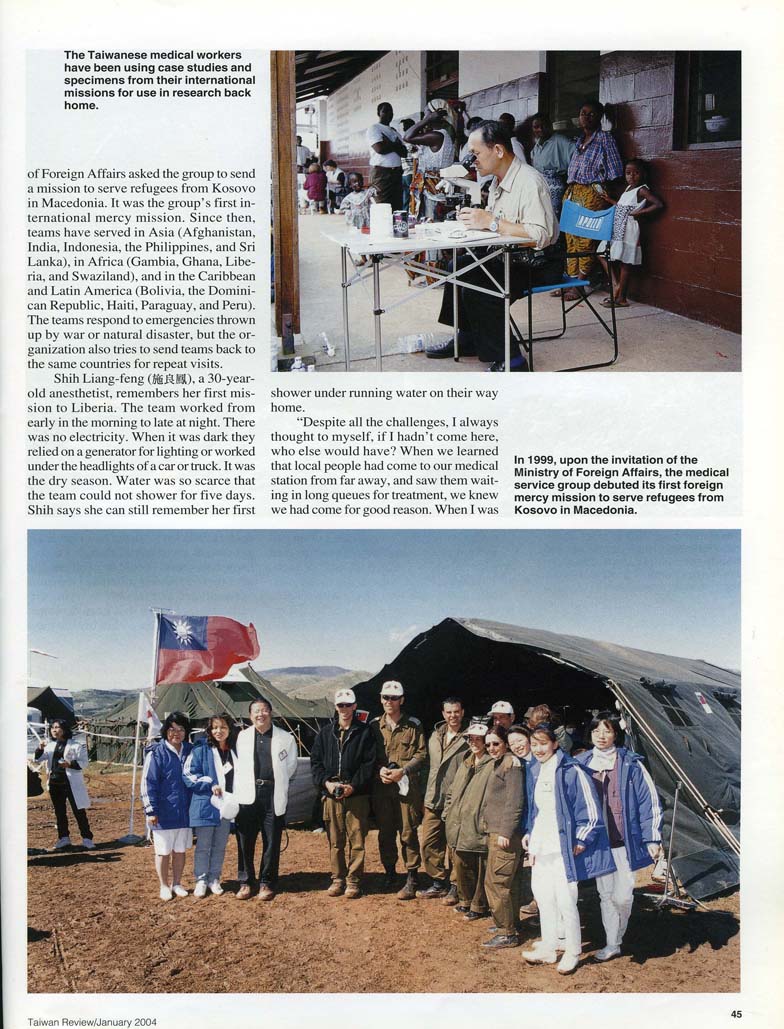
Team members say that their participation has helped them as people and as doctors. Shih says, "In the past I tended to get caught up in trivial things. I didn't know how useful I could be to others. But after these volunteer missions I am more open-minded and flexible in trying circumstances. I know that I can do something for others. "That makes my life more significant."
Chiu Ying-ming is a doctor at Veterans' General Hospital in Taichung, in central Taiwan. He says, "On volunteer missions I tend to be more patient. I show my concern for may patients while I am examining them. I listen to their problems closely. I have become aware of a contradiction in my behavior, and it has been an impact on me. I begain to think to myself, why don't I treat my patients back home in the same way that I treat the patients on these missions? Shouldn't I adopt the same attitude, regardless of the environment?"
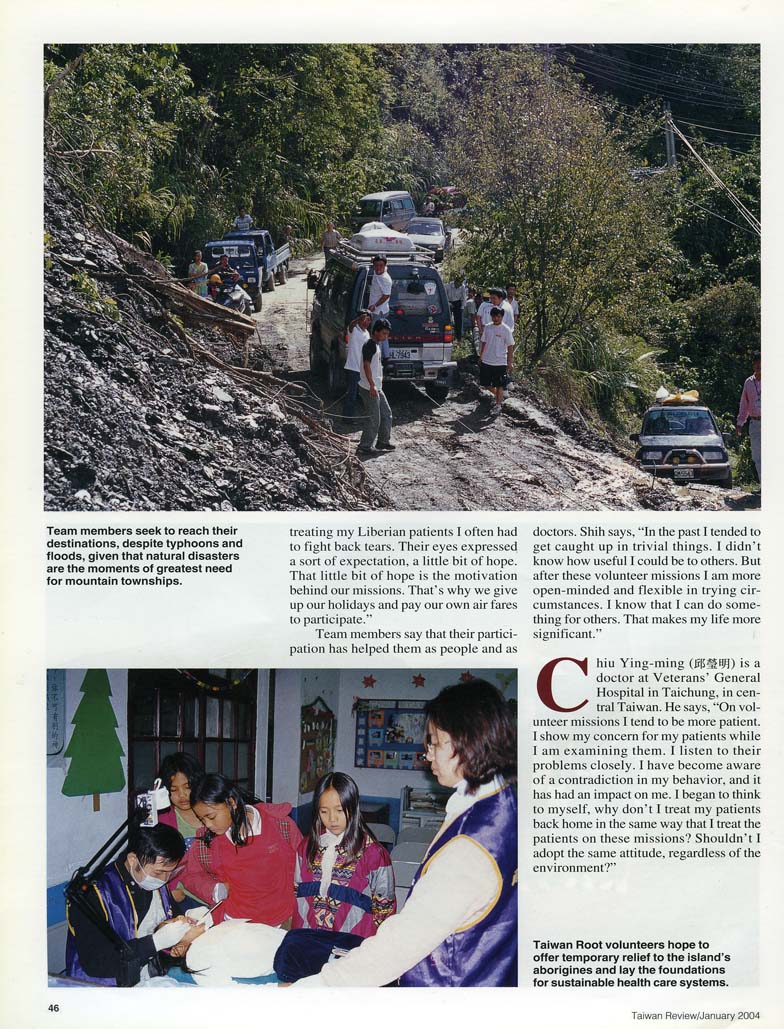
Another doctor, Liang Shih-tsung, 26, and orthopedist at Veterans' General Hospital in Taipei, has been going on missions in Taiwan and abroad since he was a medical student. He says that the missions have given him experience of medical conditions that he had previously encountered only in his textbooks. And he says that the discomforts of the missions have helped him improve his tolerance and widen his understanding
"For me, to get away from my ordinary living environment is a form of recreation. And the feeling of helping someone in need is just terrific! But these missions are more than travel, or even volunteer service. I get to understand the medical conditions in a different environment, and the people and culture and customs as well. Seeing the poverty in some places makes me more grateful for the affluence of my own surroundings in Taiwan. It makes me appreciate what I have."
The most difficult thing, both Chiu and Liang says, is to stabilize and urgent case in the field and then to have to leave, knowing that the local medical system is unlikely to have the resources for proper follow-up. That made the team doctors feel sad and helpless.
Liu, the founder, acknowledges that frustration of short missions. "Health education and preventive care can take care priority over medical treatment. They are what we can do to maximize the utilit of our visits. We are working on a teaching program for local medical workers. We hope that they can then channel the basic concepts of health care and hygiene into the daily life of their own people."
Liu says that team members have been using case studies and specimens on missions for use in research back at their hospitals and clinics. The Medical Peace Corps has collaborated on tropical disease research with the Center for Parasitic Stdies at Taipei Medical University. Team members have also participated in research on the human immunodeficiency virus and AIDS. Some of the research is conducted in partnership with organizations abroad. At the end of 2002 the Medical Peace Corps was admitted to the United Nations Conference of Nongovernmental Organizations.
The group has now organized more than 85 missios to the aboriginal regions of Taiwan and 25 missions abroad. "Over time we've trained ourselves to cope with any conditions to accomplish our goals. Liu says. "We feel proud of that."
